White plastic sheets at a glance
In our online shop, people very often search for plastic sheets in a certain colour and so the search for white plastic sheets is not exactly rare. Although we also offer the option of filtering by colour or plastic with our search function, the frequency of the search queries shows us quite clearly that many people do not even know exactly which plastic they actually need for their intended use and only the desired colour has already been determined.
This is reason enough for us to present all our plastics that are available in the colour white clearly on one page, in order to also inform about the respective advantages and disadvantages of the corresponding plastic, after all, each plastic has different properties, so that some are flame retardant, others are UV and weather resistant and some plastic sheets are approved for contact with food. As a layman, it is difficult to keep track of all this. The white plastic sheets are sorted in alphabetical order.
White ABS panels
Our white sheets made of acrylonitrile-butadiene-styrene copolymer, ABS for short, are characterised by their high impact resistance and are often used in vehicle construction or as housings for electrical appliances. ABS is often even processed in the thermoforming process to produce impact-resistant prefabricated plastic parts. ABS can be used at temperatures from -10°C to +90°C and is thus somewhat more heat-resistant than polystyrene. However, pure ABS, i.e. without an ASA top layer without appropriate surface protection is not UV and weather resistant and therefore not suitable for outdoor use. In our online shop, we offer our white ABS sheets both in millimetre-precise cuts and as standard sheets in a 2x1 metre format.
- ABS can be deep-drawn even at low temperatures
- ABS is extremely impact resistant and absorbs shocks
- ABS is very easy to bond
- ABS can be painted, printed or glued
- ABS is not UV and weather resistant
- ABS is not food-safe
- ABS is not flame retardant
- ABS absorbs ambient moisture
White acrylic panels
Our acrylic glass sheets in opal design are basically not really white, but rather milky cloudy to whitish, which is why we nevertheless carry the translucent acrylic glass sheets under the white plastic sheets. As an ideal privacy screen for balcony cladding, the UV and weather-resistant frosted plastic sheets can be used outdoors without any problems. But opal acrylic sheets can also be used for indoor applications, for example as translucent privacy screens in open-plan offices, as backlit advertising displays or for the installation of decentralised lighting in living rooms. We offer our acrylic sheets in frosted glass look in a thickness of 5mm in our online shop, cut to your exact specifications.
- Opal acrylic sheets are weatherproof
- Opal acrylic sheets are scratch-resistant
- Opal acrylic sheets are opaque but translucent
- Acrylic glass sheets can be glued together excellently
- Acrylic glass sheets can be shaped warm
- Acrylic glass is not particularly impact resistant
- Acrylic glass is not break-resistant
- Acrylic glass is not flame retardant
- Acrylic glass is not food safe
White aluminium composite panels
Aluminium composite panels in the colour white are available in our online shop in a total thickness of 3mm and are characterised by their UV and weather resistance, as well as their high inherent rigidity, which is why the panels are very popular as façade panels or for advertising signage. The sandwich panels, which are often referred to by the brand name Alu Dibond, consist of a black polyethylene core that is bonded on both sides with a top layer of aluminium to form a rigid and break-resistant panel. Aluminium composite panels are excellent for bonding and, above all, gluing, so that lettering and digital prints for attractive advertising signs can be implemented very easily. Even direct printing on the matt white surface of the aluminium composite panels is possible without any problems, provided an appropriate panel printer is available. Our white aluminium composite panels can be conveniently purchased online in millimetre-precise cuts.
- Aluminium composite panels are UV and weather resistant
- Aluminium composite panels are extremely resistant to bending and breaking
- Aluminium composite panels can be glued, pasted, painted or printed directly
- Aluminium composite sheets have excellent chemical resistance
- Aluminium composite panels are significantly lighter than solid aluminium panels
- Aluminium composite panels are not flame retardant due to the polyethylene core
- Aluminium composite panels cannot be thermally deformed
- Aluminium composite panels are not food-safe
White DecoVitas© decorative panels
Our DecoVitas© decor panels impress with their enormously high gloss level and are particularly suitable for furniture panelling, wall cladding or to set accents from high-gloss surfaces. We offer the decor panels in various trendy colours and the white ones even in two different versions. On the one hand, there is the DecoVitas© Snow-White with 1mm thickness with self-adhesive back for easy application and on the other hand in 3mm thickness, which, however, do not have a self-adhesive backing. The high gloss panels are UV and weather resistant and can therefore also be used for outdoor cladding without the white colour yellowing over time due to sunlight. The surfaces are also scratch-resistant due to the top layer of acrylic glass.
- DecoVitas© are UV and weather resistant
- DecoVitas© are insensitive to scratches
- DecoVitas© are very easy to apply
- DecoVitas© have a high-gloss surface
- DecoVitas© are very easy to clean
- DecoVitas© are not food safe
- DecoVitas© are not flame retardant
White HPL panels
HPL panels are multi-layer panels made of high-pressure laminate that are usually used for cladding facades or as balcony screens due to their building authority approval. The scratch-resistant panels are highly weather-resistant and very easy to clean. However, the sheets are quite heavy compared to other plastic sheets, which makes bonding only possible with assembly adhesives with high adhesive strength, or with screws and rivets. The operating temperatures of HPL sheets are approx. -30°C to +80°C, so that the sheets can also be used permanently outdoors at low temperatures such as frost and high sub-zero temperatures without any problems. In our online shop, we offer the white HPL sheets in the most common thicknesses in millimetre-precise cuts at favourable prices.
- HPL sheets withstand even the most adverse weather conditions
- HPL sheets have a scratch-resistant surface
- HPL sheets have building authority approvals
- HPL sheets are extremely impact resistant and dimensionally stable
- HPL sheets are physiologically safe
- HPL sheets are not flame retardant
- HPL sheets are relatively heavy
White polyethylene sheets
Polyethylene is a technical plastic that we stock in various types. Starting with the conventional HDPE through PE500 to PE1000, however, these sheets are not available in the colour white in our online shop, but in the colour natural, which however appears whitish to milky cloudy, which is why we list this sheet here. In addition, we also offer PE sheets in white with a grained surface on both sides in our shop, which, on the other hand, are coloured completely white and are UV and weather resistant. Polyethylene is characterised by its good sliding properties, high surface hardness and impact resistance, as well as very good chemical resistance. However, PE is also relatively sensitive to scratching, which is why this plastic is used for technical purposes rather than as a decorative panel for visual purposes.
- Polyethylene has excellent chemical resistance
- Polyethylene does not absorb moisture and is therefore waterproof
- Polyethylene has very good impact strength
- Polyethylene has very good resistance to low temperatures
- Polyethylene can be used at temperatures from -260° to +80°C, depending on the type
- Polyethylene is dishwasher and microwave safe
- Polyethylene has food-grade approvals
- Polyethylene in white is not UV and weather resistant
- Polyethylene cannot be glued without special adhesives
- Polyethylene is relatively sensitive to scratching
- Polyethylene is not flame retardant
White polypropylene sheets
Like polyethylene, polypropylene is a technical plastic and is also approved for use in the food industry. However, PP has a higher surface hardness than PE and can also be used permanently up to a temperature of +110°C (for short periods even up to +140°C). Similar to polyethylene, polypropylene is also highly resistant to chemicals and therefore cannot be glued without suitable special adhesives. Varnishing, gluing or printing is also not possible with PP due to its chemical resistance. Polypropylene is very often used for containers for food or also plastic housings or office articles. In our online shop, in addition to the standard sheet in the colour white, we also offer polypropylene sheets in the colour natural, which also appear whitish to milky cloudy.
- Polypropylene has good chemical resistance
- Polypropylene hardly absorbs moisture and is therefore waterproof
- Polypropylene has a high surface hardness
- Polypropylene can be used at temperatures up to +110°C
- Polypropylene is dishwasher and microwave safe
- Polypropylene has food-grade approvals
- Polypropylene is not UV and weather resistant
- Polypropylene cannot be glued without special adhesives
- Polypropylene is not flame retardant
White polystyrene panels
Polystyrene is an inexpensive and easy-to-process plastic that enjoys great popularity, especially in the field of model making. Very often, office utensils, housings and toys are also made of polystyrene. Our polystyrene sheets in white are characterised by their high heat resistance and can be thermally deformed even at relatively low temperatures. The temperature range of polystyrene is between -10°C and +70°C and therefore thermoforming of polystyrene is even possible in the domestic oven. However, the inexpensive thermoplastic is relatively sensitive to scratching and is also not suitable for outdoor use, as it is not UV and weather resistant unless the surface is painted or finished with a protective film. In our online shop, we offer white polystyrene sheets cut to size or as a whole sheet in 2 x 1 metre format at very reasonable prices.
- Polystyrene can be thermoformed at very low temperatures
- Polystyrene is a very inexpensive plastic
- Polystyrene can be bonded very easily
- Polystyrene can be painted, printed or glued
- Polystyrene is not UV and weather resistant
- Polystyrene is not flame retardant
- Polystyrene is not scratch-resistant
White sheets made of PTFE
PTFE sheets belong to the high-performance plastics and are probably better known to most people under the brand name Teflon. In our online shop, we offer PTFE in various formats as standard sheets and also in millimetre-precise cuts. Polytetrafluoroethylene, as PTFE is called in full, not only has an outstanding resistance to almost all chemicals such as strong acids, strong bases or solvents, but is also highly heat resistant and can be used at a fabulous temperature range of -200°C to +260°C. In addition, the white PTFE sheets are food-safe, weatherproof, water-resistant, flame-retardant and enormously impact-resistant. The disadvantage, however, is that PTFE cannot be pasted, printed or glued due to its resistance to solvents and that the surface is relatively sensitive to scratches. PTFE is also very heavy.
- PTFE is flame retardant according to DIN 4102 B1
- PTFE is UV and weather resistant
- PTFE has approvals for use in foodstuffs
- PTFE does not absorb water and is therefore waterproof
- PTFE has an enormous temperature range from -200°C to +260°C
- PTFE has outstanding chemical resistance
- PTFE is sensitive to scratches
- PTFE cannot be glued
- PTFE cannot be welded
White PVC panels
PVC, or more precisely polyvinyl chloride, is available in our shop as white sheets in two different versions. One of them as a standard sheet without UV stabilisation and one type as a standard sheet in UV and weather-resistant design, so that it can also be used outdoors. PVC sheets have a very good chemical resistance, but can also be excellently glued with solvent adhesives. The solid plastic sheets can also be easily painted, printed or covered with a film. The biggest advantage of our PVC sheets, however, is their low flammability, so that these sheets are also suitable for machine covers and cladding in fire protection areas. The disadvantage, however, is the relatively low temperature range of just -20°C to +60°C.
- PVC in white is available as a UV-resistant variant
- PVC is flame retardant according to DIN 4102 B1
- PVC can be glued and welded very well
- PVC can be painted, pasted and printed
- PVC has very good chemical resistance
- PVC is dimensionally stable and resistant to bending
- PVC is not food safe
- PVC has a low temperature application range

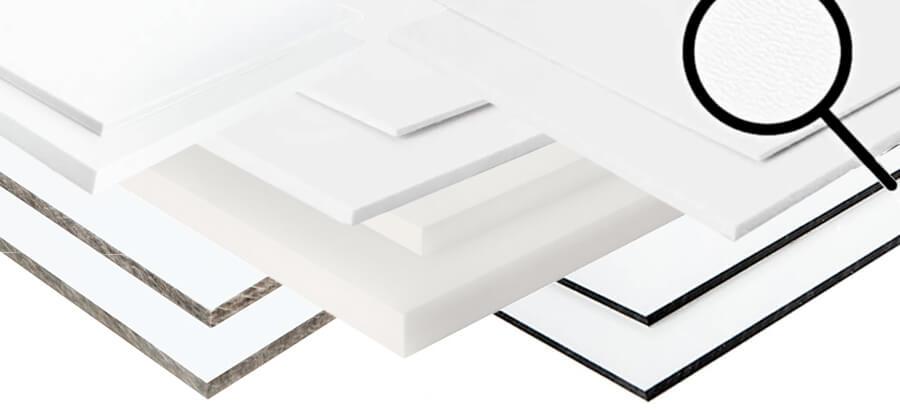
 White ABS in cut-to-size
White ABS in cut-to-size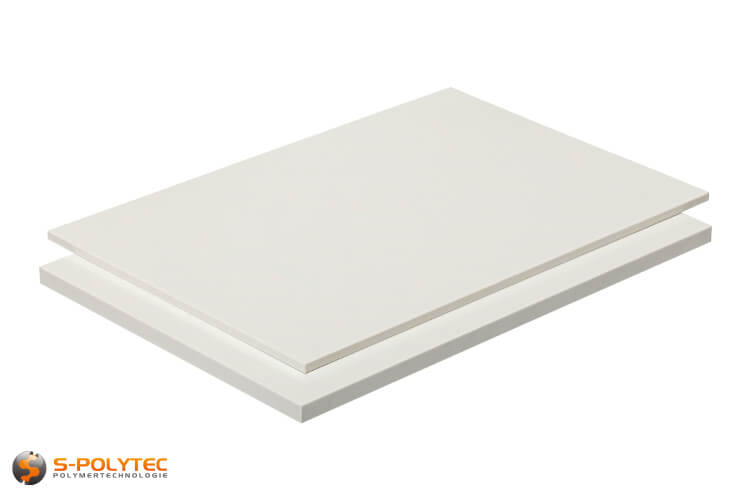 White ABS in Standard-format 2,0x1,0m
White ABS in Standard-format 2,0x1,0m Opal acrylic glass in the centre section
Opal acrylic glass in the centre section White Aluminium Composite in Cut-to-Size
White Aluminium Composite in Cut-to-Size White DecoVitas©1mm in section
White DecoVitas©1mm in section White HPL in cut-to-size
White HPL in cut-to-size PE-HD Nature cut to size
PE-HD Nature cut to size PE-HMW (PE-500) Natural in standard format 2.0x1.0m
PE-HMW (PE-500) Natural in standard format 2.0x1.0m White PP-H in standard format 2,0x1,0m
White PP-H in standard format 2,0x1,0m PP-H natural in standard format 2.0x1.0m
PP-H natural in standard format 2.0x1.0m White Polystyrene in Cut-to-Size
White Polystyrene in Cut-to-Size White polystyrene in standard format 2,0x1,0m
White polystyrene in standard format 2,0x1,0m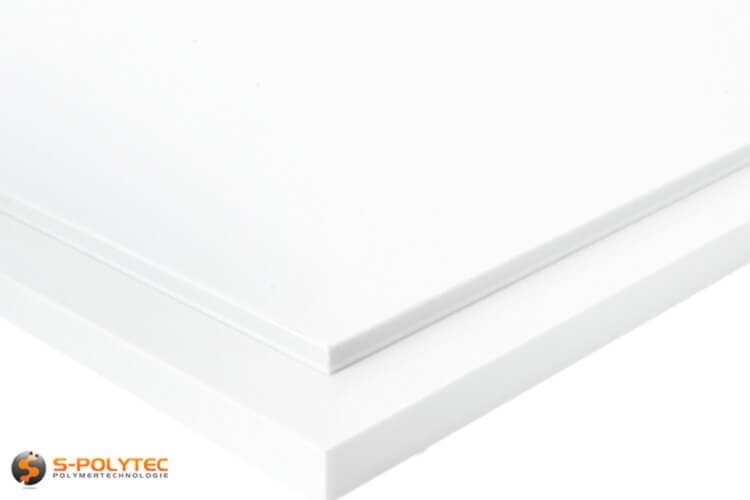 White PTFE in cut to size
White PTFE in cut to size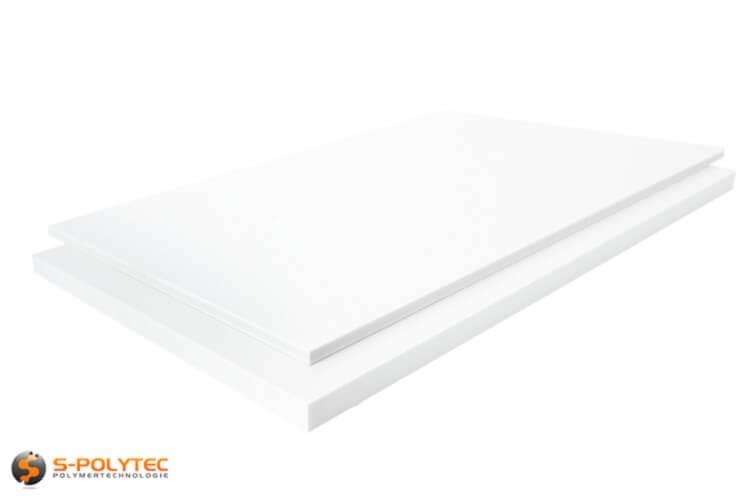 Standard size white PTFE 2.0x1.0m
Standard size white PTFE 2.0x1.0m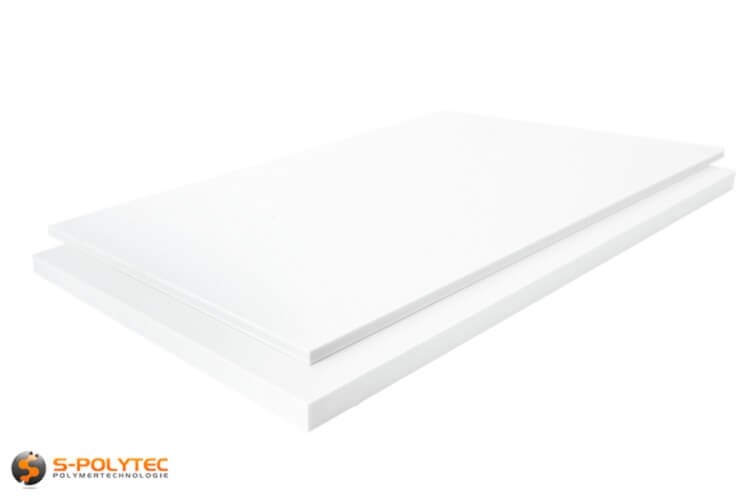 Standard size white PTFE 0.6x0.6m
Standard size white PTFE 0.6x0.6m White PVC in standard format 2.0x1.0m
White PVC in standard format 2.0x1.0m White PVC (UV) in standard format 2.0x1.0m
White PVC (UV) in standard format 2.0x1.0m